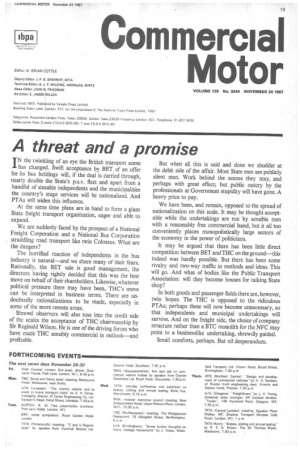A threat and a promise
Page 21

If you've noticed an error in this article please click here to report it so we can fix it.
IN the twinkling of an eye the British transport scene has changed. Swift acceptance by BET of an offer for its bus holdings will, if the deal is carried through, nearly double the State's p.s.v. fleet and apart from a handful of sizeable independents and the municipalities the country's stage services will be nationalized. And PTAs will widen this influence.
At the same time plans are in hand to form a giant State freight transport organization, eager and able to expand.
We are suddenly faced by the prospect of a National Freight Corporation and a National Bus Corporation straddling road transport like twin Colossus. What are the dangers?
The horrified reaction of independents in the bus industry is natural—and we share many of their fears. Rationally, the BET sale is good management, the directors having rightly decided that this was the best move on behalf of their shareholders. Likewise, whatever political pressure there may have been, THC's move can be interpreted in business terms. There are undoubtedly rationalizations to be made, especially in some of the more remote areas.
Shrewd observers will also toss into the credit side of the scales the acceptance of THC chairmanship by Sir Reginald Wilson. He is one of the driving forces who have made THC sensibly commercial in outlook—and profitable. But when all this is said and done we shudder at the debit side of the affair. Most State men are publicly silent men. Work behind the scenes they may, and perhaps with great effect; but public outcry by the professionals at Government stupidity will have gone. A heavy price to pay.
We have been, and remain, opposed to the spread of nationalization on this scale. It may be thought acceptable while the undertakings are run by sensible men with a reasonably free commercial hand, but it all too conveniently places monopolistically large sectors of the economy in the power of politicians.
It may be argued that there has been little direct competition between BET and THC on the ground—this indeed was hardly possible. But there has been some rivalry and two-way traffic in methods and ideas. This will go. And what of bodies like the Public Transport Association: will they become houses for talking State shop?
In both goods and passenger fields there are, however, twin hopes. The THC is opposed to the ridiculous PTAs; perhaps these will now become unnecessary, so that independents and municipal undertakings will survive. And on the freight side, the choice of company structure rather than a BTC monolith for the NFC may point to a businesslike undertaking, shrewdly guided.
Small comforts, perhaps. But nil desperandum.












































































































































